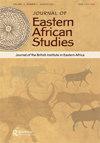刚果民主共和国东部流动听证会:起诉国际犯罪和在国家一级实施互补性
IF 0.6
3区 社会学
Q2 AREA STUDIES
引用次数: 0
摘要
摘要通过国际刑事法院的互补性原则,国际刑事执法从国际法院转移到国家法院。这导致国际行为体更加重视国家法院,以实现国际刑事司法。刚果民主共和国(DRC)为审查国家法院对国际犯罪的起诉以及国际行为体对刚果法律体系的支持提供了一个重要的例子,以促进互补性和国际刑事司法。国际行为者为流动听证会提供援助,以起诉国际犯罪,并在刚果民主共和国东部国家一级实现互补性。本文探讨了流动听证会在刚果民主共和国实施互补性方面的作用,以及国际和国家对国际犯罪起诉流动听证会的影响。主要论点是,尽管流动听证会对于使司法更接近当地社区和提高偏远和农村地区司法的知名度具有重要意义,但由于国际行为者的选择性利益以及刚果政治和军事精英的政治干预,其独立性受到质疑。本文章由计算机程序翻译,如有差异,请以英文原文为准。
Mobile hearings in the Eastern DRC: prosecuting international crimes and implementing complementarity at national level
ABSTRACT Through the complementarity principle of the International Criminal Court, international criminal law enforcement is transferred from international courts to national courts. This has led to an increase of international actors’ focus on national courts to achieve international criminal justice. The Democratic Republic of the Congo (DRC) presents a significant example to examine the prosecution of international crimes by national courts and international actors’ support to Congolese legal system to promote complementarity and international criminal justice. International actors provide assistance to mobile hearings to prosecute international crimes and to implement complementarity at the national level in the eastern DRC. This article explores mobile hearings through their role in implementing complementarity in the DRC and international and national influences on mobile hearings regarding the prosecution of international crimes. The main argument is that although mobile hearings are significant to bring justice closer to local communities and increase the visibility of justice in remote and rural areas, their independence is in question as a result of the selective interest of international actors and political interferences coming from Congolese political and military elites.
求助全文
通过发布文献求助,成功后即可免费获取论文全文。
去求助
来源期刊

Journal of Eastern African Studies
AREA STUDIES-
CiteScore
3.30
自引率
7.10%
发文量
12
期刊介绍:
Journal of Eastern African Studies is an international publication of the British Institute in Eastern Africa, published four times each year. It aims to promote fresh scholarly enquiry on the region from within the humanities and the social sciences, and to encourage work that communicates across disciplinary boundaries. It seeks to foster inter-disciplinary analysis, strong comparative perspectives, and research employing the most significant theoretical or methodological approaches for the region.
 求助内容:
求助内容: 应助结果提醒方式:
应助结果提醒方式:


